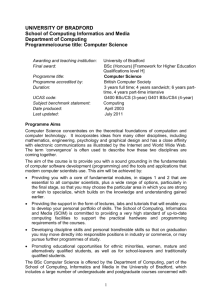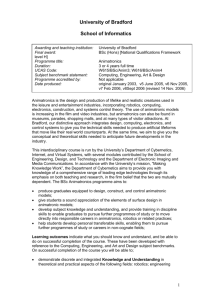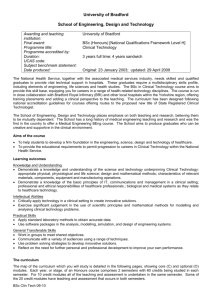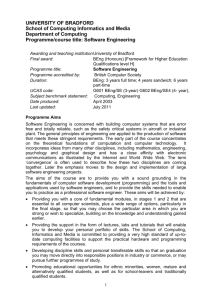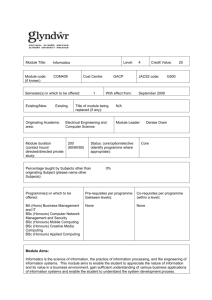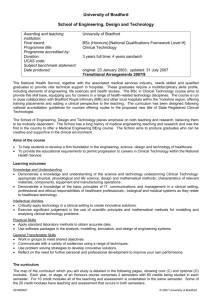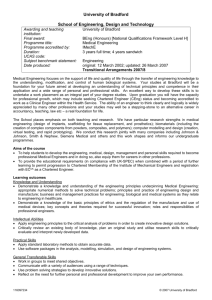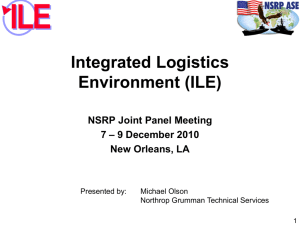BSc Intelligent Systems and Robotics
advertisement
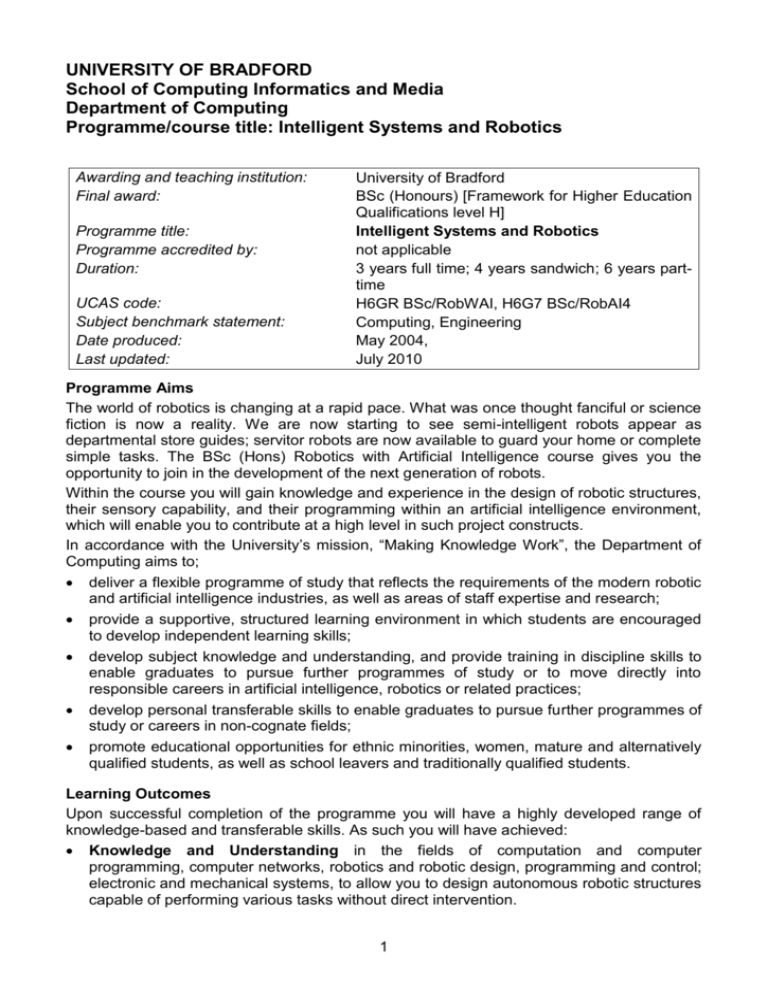
UNIVERSITY OF BRADFORD School of Computing Informatics and Media Department of Computing Programme/course title: Intelligent Systems and Robotics Awarding and teaching institution: Final award: Programme title: Programme accredited by: Duration: UCAS code: Subject benchmark statement: Date produced: Last updated: University of Bradford BSc (Honours) [Framework for Higher Education Qualifications level H] Intelligent Systems and Robotics not applicable 3 years full time; 4 years sandwich; 6 years parttime H6GR BSc/RobWAI, H6G7 BSc/RobAI4 Computing, Engineering May 2004, July 2010 Programme Aims The world of robotics is changing at a rapid pace. What was once thought fanciful or science fiction is now a reality. We are now starting to see semi-intelligent robots appear as departmental store guides; servitor robots are now available to guard your home or complete simple tasks. The BSc (Hons) Robotics with Artificial Intelligence course gives you the opportunity to join in the development of the next generation of robots. Within the course you will gain knowledge and experience in the design of robotic structures, their sensory capability, and their programming within an artificial intelligence environment, which will enable you to contribute at a high level in such project constructs. In accordance with the University’s mission, “Making Knowledge Work”, the Department of Computing aims to; deliver a flexible programme of study that reflects the requirements of the modern robotic and artificial intelligence industries, as well as areas of staff expertise and research; provide a supportive, structured learning environment in which students are encouraged to develop independent learning skills; develop subject knowledge and understanding, and provide training in discipline skills to enable graduates to pursue further programmes of study or to move directly into responsible careers in artificial intelligence, robotics or related practices; develop personal transferable skills to enable graduates to pursue further programmes of study or careers in non-cognate fields; promote educational opportunities for ethnic minorities, women, mature and alternatively qualified students, as well as school leavers and traditionally qualified students. Learning Outcomes Upon successful completion of the programme you will have a highly developed range of knowledge-based and transferable skills. As such you will have achieved: Knowledge and Understanding in the fields of computation and computer programming, computer networks, robotics and robotic design, programming and control; electronic and mechanical systems, to allow you to design autonomous robotic structures capable of performing various tasks without direct intervention. 1 Discipline Specific Skills in the conceptualisation, design and operation of robotic structures together with their programming within basic control and artificial intelligence environments, using either networked computer or microprocessor control systems. Personal and Transferable Skills in critical thinking; numerical techniques; independent learning and research; team working; IT and communication skills; creative and problem based resolution; life-long learning skills, and personal management. The Curriculum The map of your studies is detailed below showing core(C) and optional (O) modules. Each year, or stage, of an Honours course comprises two semesters with 60 credits being studied in each semester. For 10 credit modules and 20 credit double modules (last character in module code is a ‘D’) all of the teaching and assessment is undertaken in the same semester. For 20 credit linked modules (last character in the module code is an ‘L’) and the 30 credit project there is teaching and assessment in both semesters. Although the University does not recruit directly to Ordinary degrees this route is available to students for whom a less intense course of study is appropriate. Ordinary degrees comprise 100 credits in stage 1 and 80 credits in stages 2 and 3. Diploma of Industrial Studies Diploma of International Studies You have the option to undertake an industrial placement, or of studying or working abroad for a year between stages 2 and 3; this option is strongly encouraged. SCIM has an industrial training tutor who has contacts with a large number of outside organizations and who assists in helping you find a placement. Successful completion of the industrial year qualifies you for the award of the Diploma of Industrial Studies in addition to your degree. The university’s International Office provides a wide range of opportunities and support for students to gain international experience. Successful completion of the international year qualifies you for the award of the Diploma of International Studies in addition to your degree. Both options provide the opportunity to gain valuable experience, and are viewed favourably by prospective employers. Unit Code CM0113L CM0107L Level 1 1 Credits 20 20 Sem 1&2 1&2 CM0111L ENG1065L CM0116D CY0123M ENG1030M CM0218L CM0318L 1 1 1 1 1 2 2 20 20 20 10 10 20 20 1&2 1&2 1 2 2 1&2 1&2 CM0315L 2 20 1&2 CM0415L 2 20 1&2 ENG2075M ENG2018M CY0205M CY0203M CY0212M ENG3084M ENG2019M CM0347K 2 2 2 2 2 3 2 3 10 10 10 10 10 10 10 40 1 1 1 2 2 2 2 1&2 Unit Title Developing Professional Skills Computer Architecture and Systems Software Formal Foundations Robotics Software Development (Part 1) Introduction to Signals Electronics Applications Project Automation and Control Symbolic and Declarative Computing/Artificial Intelligence Computer Communications and Networks Computer Architecture and Systems Software 2 Robotics Applications Digital Electronics Design Sensors & Actuators Morphing Signals How to Run an SME Robotic Systems Embedded Systems Final Year Project 2 Hons C C Ord C C C C C C C C C C C C C C C C O O C C C O O C O C C C O O C O CM0340D CM0518D EM0359D CY0330D CM0506D OR ENG3018M CY0317M CM0328D 3 3 3 3 3 20 20 20 20 20 1 1 1 2 2 3 3 3 10 10 20 2 2 2 Neural Networks and Fuzzy Systems Concurrent and Distributed Systems Design for Mobile Content Intelligent Robotics Real Time Systems OR Real Time Computing & Instrumentation Digital Image Processing AI for Games C O O C O O O O O O O O O O Please note that, while every effort will be made to accommodate your choices, it may not be possible to permit every possible combination of optional modules, due to timetabling constraints. The curriculum may change, subject to the University's course approval, monitoring and review procedures. Assessment Regulations: a summary Comprehensive information on the University’s Regulation Governing Undergraduate Awards can be found at http://www.brad.ac.uk/admin/acsec/QA_Hbk/Undergrad_Regs_.html and the full set of Ordinances and Regulations for taught courses at http://www.brad.ac.uk/admin/acsec/taught_courses.html). To pass and proceed from each Stage to the next, and also to be eligible for a classified Honours award, you must achieve at least 40% in 100 credits and 35% in the other 20 credits at each Stage of the course. The class and division of the Honours degree that you are awarded is based on the overall weighted marks that you receive for each Stage. Stage 2 contributes 30% and Stage 3 70% to the award. The classes and divisions of the Honours degree are awarded on the basis of the following minimum final overall weighted average marks: 70.0% or above: 60.0% or above: 50.0% or above: otherwise: First Class Honours Second Class Honours – First Division Second Class Honours – Second Division Third Class Honours If you complete Stage 1 successfully, you are eligible for a Certificate of Higher Education; if you complete Stage 2 successfully, you are eligible for a Diploma of Higher Education. The learning outcomes for these awards and the final award are consistent with those of the Framework for Higher Education Qualifications in England. The progression and award regulations for Ordinary courses are similar to those for the Honours courses, except 40% must be achieved in 80 credits at Stage 1 and in 60 credits at the subsequent Stages. Learning, Teaching and Assessment Strategies The course is designed to give you a wide experience of teaching, learning and assessment strategies. Concepts, principles and theories are generally explored in formal lectures, practised in associated tutorials and seminars, and demonstrated in laboratory classes. Practical skills are developed in laboratory sessions. The course is designed to allow you to develop and enhance your practical and inter-personal skills through working in small groups engaging in problem solving scenarios. Project work is included to allow you to demonstrate your ability to solve problems using the knowledge, understanding and skills you have gained during your course. Each 10-credit module on the course requires you to commit an average 100 hours of study. Some of these hours will be formally timetabled - lectures, laboratories, seminars and 3 tutorials – while others involve private study. The balance between these forms of study changes as you pass through the three years of the course. There are more “contact hours” (time spent with tutors) in the earlier stages of the course; by the final year you are expected to manage your own learning, under the general guidance of your tutors. An optional placement year, normally taken between Stages Two and Three, will enable you to extend and apply your learning in an appropriate industrial/commercial context, and gain first-hand experience of how your skills might be applied in the workplace. The Assessment methods you will encounter are varied and your progress will be reviewed using a mix of formal examinations, reports, laboratory portfolios, essays, oral presentations (either individual or team) and the final year dissertation. Your performance in each module will be assessed using a mix of these assessment systems to allow you to demonstrate the particular module learning outcomes. Admission Requirements Offers are made following detailed consideration of each individual application. Most important in the decision to offer a place is our assessment of a candidate’s potential to benefit from their studies and of their ability to succeed on this particular course. Entrance requirements will vary but are set after consideration of each applicant’s academic background and achievements and all other relevant experience. A typical offer to someone seeking entry through the UCAS scheme would be the attainment of a total of 240 UCAS tariff points. Applications are welcome from candidates with non-standard qualifications or who, lacking academic qualifications, have significant relevant experience. Applicants whose first language is not English will also be expected to possess an English Language qualification approved by the University, such as IELTS at 6.0 or TOEFL at 550. Student Support and Guidance All students admitted to the School of Computing, Informatics and Media (SCIM) undertake a process of induction led by a senior member of staff. Thereafter, ongoing support for students is provided in the form of one-stop facilities located at the SCIM Student Support Office (SSO) in Horton A2.09, which is open throughout the day during term, restricted hours outside term. Also support for registered students is provided 24/7 via the intranets of SCIM, Department of Computing and the School’s Technical Support. The School uses the University’s Virtual Learning Environment (VLE) to support students on their individual modules. As a student on the BSc (Hons) Robotics with Artificial Intelligence, you will be allocated a personal tutor who provides support and guidance on matters relating to your learning, teaching and academic progress. There are specialist tutors in the School who deal with issues where other social factors (relating to gender or disability, for example) may have an impact on your academic performance. The Student Staff Liaison Committee gives the opportunity for you to give formal feedback to the Course Team and Department about curricular issues and the general running of the programme. The University of Bradford provides important facilities such as extended access to library and computing services, the Learner Development Unit, counselling and welfare services, and careers advice. The Disability Office provided targeted support for all students with known disabilities and routinely arranges dyslexia assessments and appropriate support (i.e. reasonable adjustment) for disabled students. Further Information For further information, please check the University prospectus or contact Admissions. The Admissions Office The Recruitment and Marketing Office 4 The University of Bradford Richmond Road Bradford, BD7 1DP UK +44 (0)1274 233054 http://www.brad.ac.uk/courses/ School of Computing, Informatics and Media The University of Bradford Horton Building Richmond Road Bradford, BD7 1DP UK +44 (0)1274 235963 ugadmissions@scim.brad.ac.uk http://scim.brad.ac.uk/courses/ug/ Disclaimer The details of this Programme Specification and information contained therein are subject to change in accordance with the University of Bradford’s course approval, monitoring and review procedures. 5

